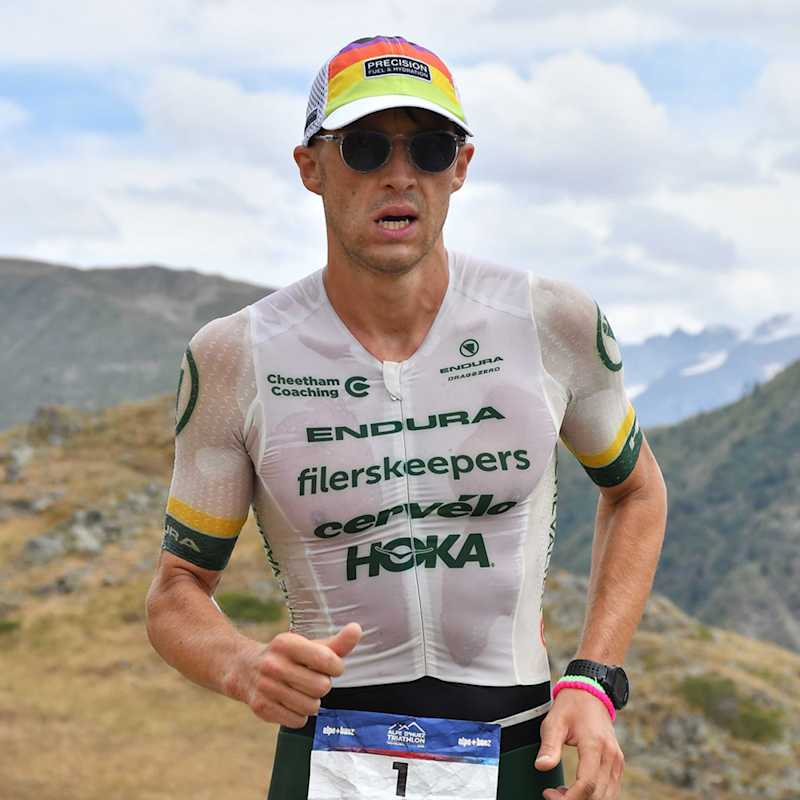
Leon Chevalier
IRONMAN 70.3® Vichy
Leon's headline numbers
Leon's strategy
Fueling
Carbohydrate is the main fuel you burn when racing. Failing to fuel properly is a leading cause of underperformance in longer races.
Leon has a well rehearsed fueling strategy which has served him well across previous middle and full distance triathlons. Fortunately, he was able to stick to his plan despite this race becoming a bike-run duathlon and enduring a crash within the first 10 minutes. While we usually recommend athletes follow a ‘decoupled’ approach to their fuel and hydration, Leon opted to combine his carbs and electrolytes by adding a PF 90 Gel to each of his 1L PH 1500 (Drink Mix) bottles. This strategy allowed him to consume ~124g/h on the bike followed by ~95g/h during his 1 hour 11 minute half marathon. Leon can hit these carb numbers with no GI distress, even at his high speeds, due to rigorous gut training, practicing with both the quantity of carbs, fluid and sodium, as well as the format he is using to reach those.
Hydration
Taking on board an appropriate amount of fluid and sodium is essential to maintaining blood volume and supporting the cardiovascular effort needed to perform on race day.
Whilst the absolute amount of sodium and fluid consumed per hour is important, it’s critical to consider these in relation to each other. This is known as 'relative sodium concentration' and it’s expressed in milligrams per litre (mg/L). How much sodium you’re taking in per litre of fluid is more important than the absolute amount taken in per hour.
Sweat sodium concentration (mg/L) is largely genetically determined and remains relatively stable. Knowing how salty your sweat is enables you to replace a good proportion of your sweat losses, which can range from 200-2,000mg/L.
Given Leon’s losses are High (1,392mg/L), nailing his hydration strategy becomes especially crucial when it’s hot and/or humid.
Learn moreLeon has a high sweat sodium concentration so takes proactive measures to maintain fluid and electrolyte balance. On the bike, he consumed a relative sodium concentration of ~1,538mg/L using PH 1500 (Drink Mix). By taking on this slightly stronger concentration on the bike, he allowed for a natural taper in sodium intake during the run when access to hydration is a bit trickier. That said, Leon ended up not taking on any sodium during the run and only drank ~250ml water from aid stations. While he avoided symptoms of dehydration in the race, Leon experienced severe cramping after and struggled to get back on top of his hydration for a couple of days. To prevent this in future, Leon would benefit from carrying Electrolyte Capsules on the run to replace an appropriate proportion of the sodium he is losing in his sweat, especially as a salty sweater.
Caffeine
Beyond the Three Levers of Performance (carb, sodium and fluid), caffeine is one of only a few substances that is proven to improve performance for most endurance athletes as it can help stave off mental and physical fatigue.
Between the PF 30 Caffeine Gel in the 30 minutes before he started and another on the bike, Leon had a total of ~3.04mg/kg of caffeine in an attempt to benefit from the ergogenic effects of the stimulant.
How Leon hit his numbers
Here's everything that Leon ate and drank on the day...
Leon's weapons of choice
Final thoughts
Leon's full stats
Data Confidence?
There is good confidence in the accuracy of the data reported. An athlete feels that the numbers closely reflect what they consumed despite a couple of estimations which may carry some degree of error. The majority of what was consumed is recorded to a high level of specificity (most volumes are known through the use of bottles brands quantities flavours). The numbers are very plausible and align with previous data recordings (if an athlete has collected data previously).